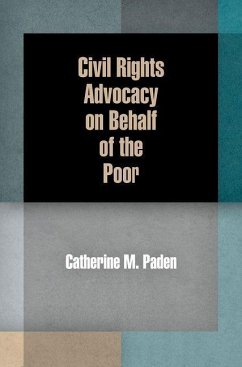Representation of the poor has never been the top priority for civil rights organizations, which exist to eradicate racially prejudiced and discriminatory practices and policy. Scholars have argued that the activities and ideologies of civil rights groups have functioned with a distinct middle-class bias since well before the 1960s civil rights movement. Additionally, all political organizations face disincentives to represent the poor-such advocacy is expensive and politically unpopular, and often involves trade-offs with other issues that are more central to organizations' missions. In Civil Rights Advocacy on Behalf of the Poor, Catherine M. Paden examines five civil rights organizations and explores why they chose to represent the poor-specifically low-income African Americans-during six legislative periods considering welfare reform. Paden's archival research into groups such as NAACP, the Congress of Racial Equality, and the Southern Christian Leadership Conference, and her extensive interviews with movement leaders and activists reveal that national organizations advocate on behalf of the poor when they have incentives to do so. Organizational decisions to represent the poor are sometimes strategic, sometimes based on an ideological commitment, and sometimes both. However, Paden points out that decisions are never purely ideological-groups are always aware of strategy and of their positions within their issue niche when they fix their priorities. Civil Rights Advocacy on Behalf of the Poor also points to the critical role that radical organizations play in increasing representation in the U.S. political system. Paden maintains that radical groups matter not because their representation affects long-term policy change or is particularly effective in representing the interest of marginal groups. Rather, she argues, it is because they compete with more mainstream or conservative organizations for their constituencies.
Dieser Download kann aus rechtlichen Gründen nur mit Rechnungsadresse in A, D ausgeliefert werden.









